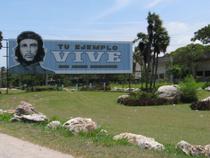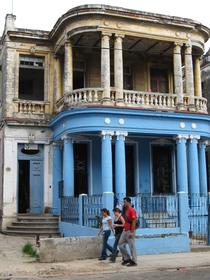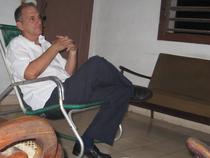Cuban all-inclusive: dissidents, Communism, American cars and apartheid tourism
 |
| Cultul lui Che Guevara Foto: Hotnews |
 |
The Aeropuerto International Jose Marti meets us with a wet stink. Instead of welcome, the border officer barks shortly: “Look at me, look at me!”. Europe and its rules were lost on the Charles de Gaulle airport, back in Paris. In Havana, not as a novelty, everyone smokes as a horn. As soon as they step out of the plane, they light up their cigarettes and puff the cheap tobacco in the middle of a swampy air.
A cab takes us in the city for 25 euro, although the price is half of it. Or at least that’s what our tourism guides say. The driver, a mustached Métis, wins the argument without any battle. Exhausted as we are, we let him rob us and proceed towards Havana, a trip that leads us straight back in time. We enter a living graveyard: American cars from the ’50’s, bikes, strange harnesses. A lot of propaganda, a worshiped Che Guevara and political slogans. As wide as the side of an apartments block, Che’s face and a message written in red: Ante la amenaza y la agresion, Cuba responde: mas revolucion! But Havana seems to have went deep asleep, destroyed of all the revolution going on.
We descend a few step away from the Habana Libre hotel, on the poorly lit street called Basarrate, parallel to the dike of eternal boardwalks, Malecon. We’re greeted by our host, Jeusello. Only one of his two rooms is free. He moves me to a neighbor, also a private house, meaning authorized to receive foreign guests. Across the street, a smoked three-stories building. The room is on ground level, inside a dirty apartment, protected by iron grills, beside the doors.
 |
| Casa coloniala din cartierul Vedado, Havana Foto: Hotnews |
 |
The house has a fermented garbage stink. Two fans stir the stink coming from the dumpster across the street. There are no windows, only wooden shutters. There is no hot water, the sheets are dirty, a carpet with a bull fighter killing a bull hangs above the bed. Jose, the owner, leaves. I can call him if I need anything. I move the next day.
„Casa privada” is a way to call it. Cubans rarely own any proprieties, most of them are state-owned. Those who insist to sell are forced to sell at a price decided by the state. Cheap change. So, house owners never sell, those who don’t own a home never even dream of having one. Former Romania president Ion Iliescu would love this country: the propriety is a true trifle here.
Here we are, tenants in other tenants’ homes. The new room, in a house with vague colonial touches, seems more reasonable. It is unnaturally tall and narrow, smelling of old furniture. Better rotten wood than fermenting garbage.
Cuentapropistas, as small entrepreneurs are called, first appeared in Cuba some ten years ago, as a solution to the crumbling economy. The regime still doesn’t care too much for them, burdening them with taxes. In order to maintain a „Casa privada”, they pay some 150 pesos convertibles per month (150 $), even they don’t receive any guests that month. There are also income taxes. They may rent only two rooms. Meanwhile, says Jeusello, the state stopped licensing the activity. last month there were no guests, so he paid everything out of his pocket.
The Cult of personality and Fidel
The Che Guevarra cult surpassed Ceausescu by far. Che is postcard, highway poster, in every store and restaurant. In private homes, on walls, medals, t-shirts, souvenirs and hats. He is the martyr of the Revolution: tu ejemplo, vive!
 |
| Dizidentul cubanez Renne Gomez Foto: Hotnews |
 |
being as dead as he can be, a victim even more, the former comrade of withdrawing commandant Fidel, Che is still the best propaganda agent for the regime. On the way to Santa Maria, we see a silhouette of Fidel drawn on a wall, beating a simple soldier uniform and a backpack. He may be a simple soldier, but the message is one of a general: Comandante en jefe ordere! (The chief commandant is the one who orders). Just to be clear for everyone who’s the boss in Cuba.
Elite dissident: Rene Gomez
„Everything works badly here, except for the propaganda and the repression”. Rene Gomez, a lawyer in his sixties, but still young at heart, was in jail two times, between 1997 and 2000 as well as 2005-2007. Arrested without a warrant, he was never judged. He was expelled from the bar 13 years ago and has lost his right to practice his profession. Instead, he leads a company of independent lawyers who fight for civil rights.
Calm and sure of himself, he talks about Raul Castro and the apparent changes in the country: „He’s surrounded by the same leaders as 50 years ago, except for Fidel”. Hearing the last speech held by Raul, Gomez sees signs that the Communist elite prepares to make some changes. Raul promised to give land to peasants, but it is not clear how this will happen. There won’t be, in any case, a transfer of property from the state to the people. It may be, as most, a 10-years lease.
Until last year, Cubans were not allowed to rent a room in a hotel, to rent a car or own a mobile phone or a computer. „One year ago, the Communist elite was explaining why we shouldn’t own these things”, says
Rene Gomez, denouncing the apartheid tourism Cuba practices.
Repression methods used by the political police
Most often, the dissident says, repressing dissidents means having them arrested under a charge that opens the way to abuse: the possible threat to commit crime. Officially, they sent you to re-education camps; in fact you go to jail along with rapists and thieves. In more domestic ways, there are the same old attacks against the private life. Mrs. De Marina was forces to divorce recently, so that her son wouldn’t be expelled from the University. All of a sudden, all her relatives begun to tell her that she should leave her husband, Renee. She believes it was all handled by the political police.
Renne Gomes is one of the most respected Cuban dissidents. His criticism against the regime is very targeted: he analyzes each law adopted by the National Assembly and publishes, along with 12 other lawyers, a legislation bulletin.
Hot Sunday in Vedado
The North-Eastern Havana – a strange mixture of poverty below the extreme line and posh living. Villas with a shining ground level and a first level in ruin. Clothes hanging out to dry between baroque columns, gardens filled with flowering cactuses and car wrecks rusting in front of iron gates.
Downtown Havana looks like downtown Bucharest: holes in roofs, wall plaster crumbling to dust, fallen balconies and smoked walls.
We pass by the ETESCA headquarters, the Cuban mobile telephony company. The state recently sold some of the stock to the Italians at Telecom, a company quite active on the Cuban market. Fiat sells cars for prices way over the Cubans possibilities to buy. Anyway, the average Cubans don’t have the right to buy new cars.
The European Union recently lifted the economic embargo against Cuba, the same embargo the US has maintained for over 50 years. The Europe of historic fictions makes a mistake offering legitimacy to a regime just as illegitimate and murderous as Romania had with Ceausescu.
The pride of Cubans is in their 50-years old American cars, bought before Castro’s revolution, who declared all of them as national patrimony. Shadows of a long lost prosperity are still reflected by former luxury cars:
Mercury, Pontiac, Chevrolet, Plymouth and Buicks. A superb ’58 Plymouth is worth some 5,000 dollars here, but the owner has no reason to sell it: he has nothing to buy instead. Most cars are wrecks anyway.
The alternative is the Russian Lada, much worse and unsafe. The European cars are scarce and sold preferentially by the state, as a reward or a privilege. They are forbidden to common Cubans. Jessuleo sold his ’50 Chevy for a few thousands of dollars in order to open two rooms for tourists.
(Havana, Friday-Sunday, July 11 – 13)
Note: HotNews.ro publishes a series of reports on Cuba. The documentation was realized though the „Strengthening of the Central and Eastern Europe’s solidarity with Cuba” program, conducted by the Pro Democratia Association.
(After an article by Dan Tapalaga)
 INTERVIURILE HotNews.ro
INTERVIURILE HotNews.ro





